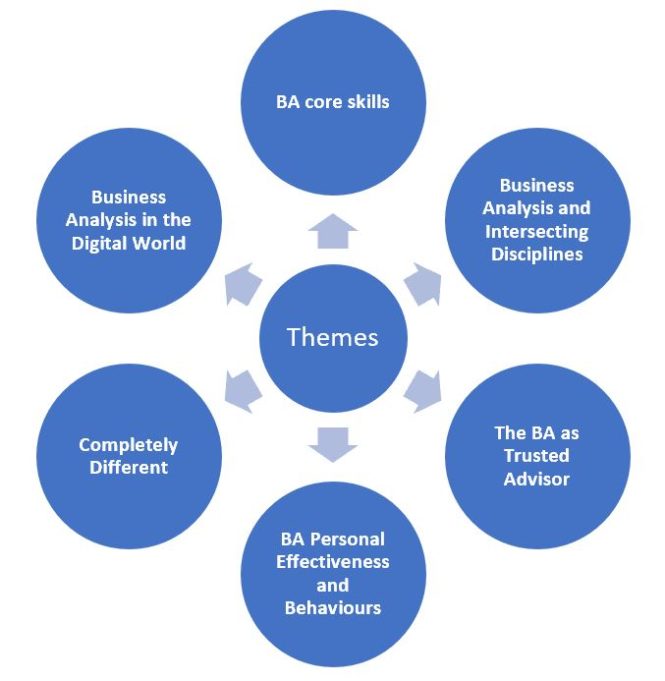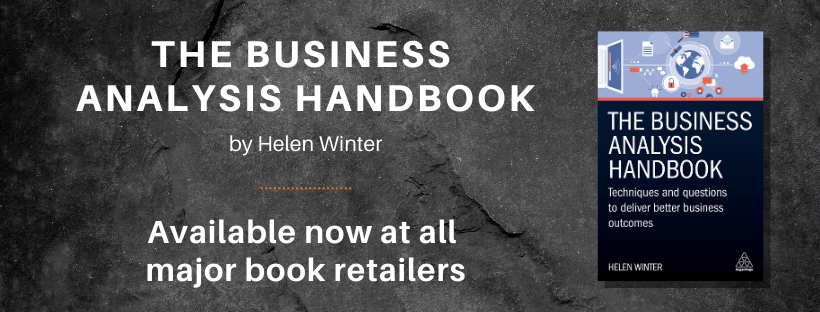
The European Business Analysis Conference is on for 3 days from the 23rd to the 25th September in London. It is hosted by the IIBA UK chapter (International Institute of Business Analysis), BCS – the Charted Institute of IT (British Computing Society) and AssistKD.
I’ve been going for several years and it’s so great to have so many people in the profession under one roof with so many learning and networking opportunities.
Day 1 tends to consist of half and full day workshops. Some of these provide the opportunity to gain BCS certification. Days 2 and 3 have more than 60 sessions covering speakers across 6 different subject areas. This makes it easier to focus on the subject areas you might be interested in most.
If you are planning on going to this conference, Business bullet is a media sponsor. Quote BB10 when booking to get a 10% discount. I’m also having my book launch party on the Tuesday 24th to make it easier for conference goers to also attend the party. Tickets for the book launch can be ordered here. My new book is called The Business Analysis Handbook – Techniques and Questions for better business outcomes. It is out on the 3rd September and can be ordered The book is available from here and all major print and e-book retailers.
I will now provide a summary of what I am looking forward to. Even if you can’t make the conference the topics I’m highlighting will be useful for you to be aware of. Being aware of topics in conferences will help highlight new trends and how the business analysis profession is maturing.
Backlogs – the Good, the Bad and the Ugly – Lynda Girvan, HoP for BA and Agile Coach, CMC Partnership Consultancy
Anyone working in an agile environment should find this session useful. A backlog is a list of all the type of work that needs to be done on a project prioritised in the order of importance according to business value. It can cover requirements, change requests, bugs and much more. As you can imagine this could get very large and if not managed well could cause difficulties. I am looking forward to hearing about Lynda’s tips for managing this and what to avoid.
Victim Statements, Suspect Interviews & Presenting at Crown Court… – Charlie Payne, BA Manager, National Grid
What I like about this one is that it shows how the skills you may have obtained in other professions can be cross transferable into business analysis. I have seen Charlie present lots of times and he is a really animated speaker that will hold your attention. I also like the focus on soft skills as this is one of the most important traits to have in business analysis. Quite often in business analysis you must persuade stakeholders that have their busy day jobs to do to give them your time. If you have good soft skills and they like you then you are more likely to get information from them and their time.
Our Journey in Using Visual Facilitation Techniques – Ann Mistiaen, Business Analyst & Nikolaas De Graeve, Business Analyst, Novado
This one will provide visualisation techniques and examples when running workshops. Workshops are a popular method for obtaining requirements. The more dynamic you can make them, the more contribution you will get from your attendees. Being confident enough to use visual techniques will help control the pace of the workshop and reduce your chance of ambiguity. The benefit of diagrams is that they are very black and white and less likely to be open to different interpretations.
Making Workshops More Engaging and Interesting Using Design Thinking Techniques – Helen Winter, Principal Business Analyst, HWinter Consultancy
I’m presenting this one. This is a similar theme in helping to make workshops more interactive. I am a design thinking practitioner and I have found some of the techniques that I will share with you useful for making workshops more engaging. I will share tips on how they can be used to overcome typical problems like stakeholder engagement, preventing someone from dominating the workshop and ensuring everyone gets a voice.
Data Analysis: Evolution from Business Analysis – Rosanna Choy Ang, Lead Business Analyst, ThoughtWorks
Data requirements are a key part when gathering requirements. They tend to need to be looked at from a different point of view to business or system requirements. They involve asking different questions and there are specific data modelling techniques that aid it. Sometimes there are dedicated data analysts that help document these but often it is useful for a business analyst to understand and be able apply this skillset. This is why I think this is an important subject area. I’m coming across more projects that are dependent on centralising and querying data so this is definitely an area useful to know about.
Capability Models are Not Just for the Architects! – Sarah Cockrill, Head of Business Analysis, Coventry University
Business analysis is increasing being applied to aid strategic decision making applying analysis techniques at company level. Capability models are useful if you are involved in this or for large transformation projects.
Working with the Enemy: Pinpointing Relationship Difficulties and Approaches to Address Them – Julie Sutton, Business Analyst, Taylor & Francis
You will notice many of the talks being based around soft skills. This is so important for a business analyst because we are so dependent on getting information from others. It is likely you will come across people on your journey in business analysis where building a relationship can be more difficult and where conflict needs to be handled. Julie provides the benefit of her experience and techniques she found useful.
BA Head in the Cloud – Glenn Milton, Senior Business Analyst & Louisa Crowe, Senior Business Analyst, Aviva
It is increasingly important for business analysts be aware of new technologies and how it impacts analysis required. Glen and Louisa cover what cloud migration means for an organisation, its environment and operating model. I have noticed more of a trend for applications moving away from on premise to cloud technology which makes understanding the impact for business analysis even more valuable.
Playing Football With Hippos – Marc Huntington, Business Analyst & Louise Chew, Business Analyst, AO.com
Hippo stands for highest paid persons opinion. When eliciting requirements or running workshops this can happen. Sometimes this means that people who could contribute don’t, even if they have valuable information. The presenters will talk about their experiences and how you can deal with this.
Business Analysis: The Middle Way – David Beckham, Senior Business Analyst, Aviva
I’ve picked this one because I think cross referencing other industries and disciplines can be a useful exercise, taking the lessons learnt from them that can be applied to business analysis. David is going to explain how Samurai Japan principles can relate to a business analyst and the very important concept of leading from the middle.
Wellbeing: What is it and Why Should I Care? – Corrine Thomas, Director, Choices Coaching Ltd
Doing business analysis often means the need to be resilient and having tenacity. Corrine covers the importance in looking after yourself to be able to maintain these qualities in the long term. I’m also looking forward to hearing about her ideas for embedding wellbeing into the culture of teams.
Leading the BA Service – Christina Lovelock, BA Manager, University of Leeds & Dr Debra Paul, Managing Director, AssistKD
Its great when companies have a mature enough business analyst team to turn into a practice. This means creating a community with measured standards and promoting the practice by providing a set of services. This will be useful for those wanting to understand how the BA service in an organisation can be defined and improved.
Whose Perspective Is It Anyway? Practical Analysis Techniques for Understanding Tricky Stakeholders – Adrian Reed, Principal Consultant / Business Analyst, Blackmetric
I’m looking forward to this one as Adrian is exploring different perspectives of stakeholders and how it can lead to messy situations. It is so common to need to consider the different perspectives and any tools we can have in the BA toolkit to understand and manage these the better.
Add a Pinch of Visuals for Creative Collaboration! – Penny Pullan, Director, Making Projects Work
It can be very difficult to get stakeholders to read your documentation, Penny provides techniques for how to better engage your stakeholder by making more use of visuals. I’ve seen Penny present many times before and its great to view techniques to show how easy it can be.
Conclusion
Attending conferences or being aware of what is being covered in them will help show trends of the profession if you are an already experience business analyst. If you are new to business analysis or looking to get into the industry you can also use the agenda as a guide as to what cross transferable skills you already have or topics of interest you can find out more about to help your career
Thoughts? Questions? Please share in the comments.


Great article Helen! and not just because you very kindly mention my session but because you are completely right in what you say! My career has blossomed since I first attended and spoke at BA Europe six (?) years ago. not in the sense that I’ve rocketed up the promotion/salary table but more the fact that I am much more fulfilled by my experiences and the people I have met and become acquainted with. I wouldn’t be the part-time blogger, part-time motivational speaker and sort-of mentor/coach that I am today without these things so my advice to attendees at such events is go, dive in, listen to some sessions but above all mingle, it’s worth it!
Thanks David, good advice.